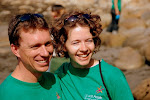February 25, 2008: Our first week-long city was over in the blink of an eye.
It was such fun to stay with Kate and Andy Menschner, who just recently moved to
Des Moines with their friendly bulldog,
Penny Lane. (Katie is Ellen’s good friend from high school).
Our travel to Des Moines was treacherous – we saw literally hundreds of vehicles in the ditch of I-80, which was designated a no-tow zone because of the inches thick glazing of ice on the road. We also hit an extremely cold snap, where the highs were just around zero with bitter winds. We changed a cast ice-skating event at the last minute to an indoor rollerskating party instead, as the weather was too miserable to have people skate outdoors for 2 hours.
We were sponsored by Holmes Honda, the owner of which created a foundation called Kids Against Hunger of Des Moines. We worked alongside community volunteers all day on Tuesday packing meals. The cast scooped rice, soy, dried vegetables, and a vitamin packed bouillon tablet into a 400g plastic bag, then sealed them and packed them in boxes to be shipped to underdeveloped countries in turmoil, like Haiti and Zimbabue. Our goal was to pack 200,000 meals in one day. Success! We ended up packaging 251,640 meals, and a small group of students also did short UWP performances eight times throughout the day. It was fun to have Emily come and volunteer with us in the afternoon.
We performed the UWP Show for over 1,000 people at the Des Moines Civic Center. Thank you to the volleyball friends group for making the trek to see the performance. Scott was in the audience and said it was this cast’s strongest show yet on the road.
We also had our first significant regional learning day… we toured Pioneer Labs, which is a Du Pont company that engineers seeds. Some are genetically modified, others are cross-bred for higher yield or to effectively deter pests. It was fascinating to talk to their scientists, including Dwight, who holds the patent on the first gene particle gun, developed in the 1980s to literally shoot genes into a plant seed cell to experiment in plant genetic modification. This topic is fairly controversial, with strong differing opinions in various parts of the world, and the representatives of the company did a fantastic job of answering our tough questions.
Their take on genetic modification is this: The population of our earth is growing rapidly. To feed that population, either we can grow more food on the land we currently use, or we need to use more land to grow more food. Other modifications beides higher yield also can include putting small amounts of toxins in the seed that will kill root-eating or plant-infesting bugs when they eat the plant, but is much less chemical than using pesticides to spray the plants once they are grown. Farmers that use these modifications also need to plant a certain percentage of their fields without this chemical, so the bugs aren’t completely eliminated from that region. We visited labs full of petri dishes and test tubes of baby corn stalks, and the whole experience was fascinating.
We also heard from the president of the World Food Prize, which was created by a Nobel Peace Prize Laureate to acknowledge significant achievements in agriculture in relation to human food supply.







